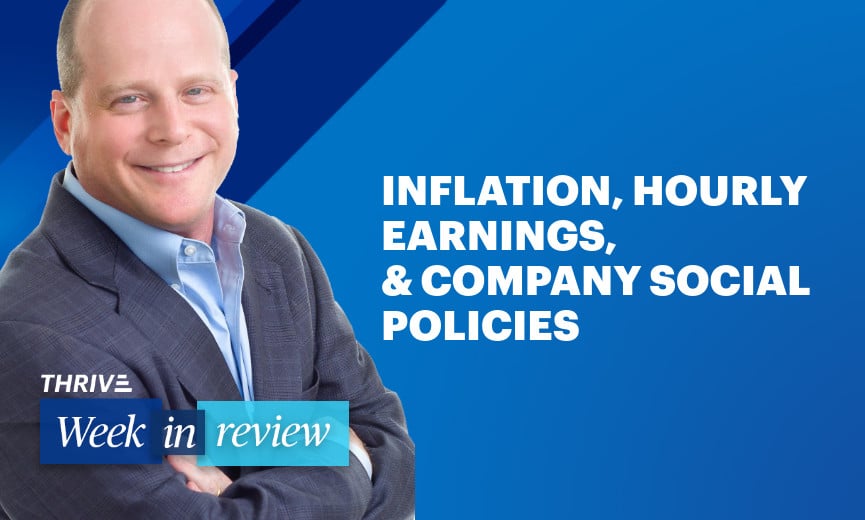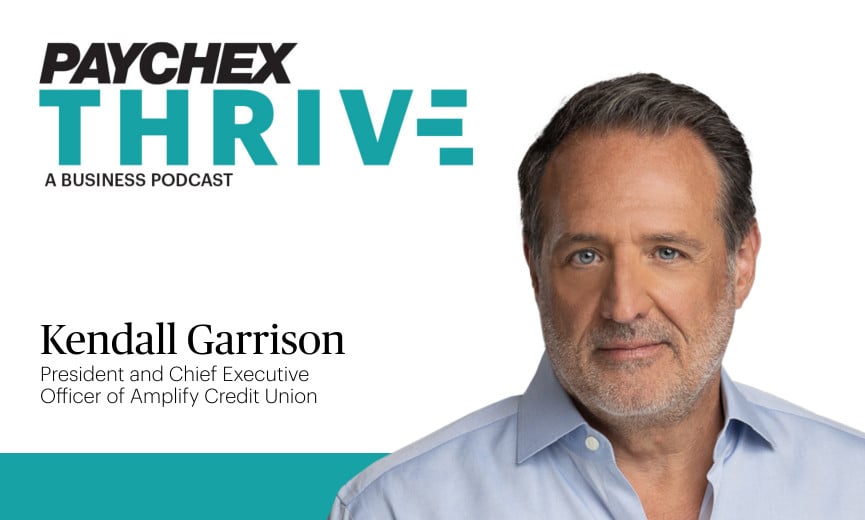Inflation Rising, Monthly Hourly Earnings Decreasing, and Auditing Social Policies

Podcast •

Watch
Summary
It’s not so much that inflation has hit its highest point since June 2024, rising to 3% in January, that has businesses owner and host Gene Marks concerned. Rather, it’s that wage growth isn’t matching inflation. Gene explains some of the reasons why the cost of goods and energy are increasing, but it businesses get spooked by inflation, their employees suffer on any financial cutbacks that might be used to combat it. Gene also offers some insights as to why the change in climate around DEI at the federal and state level should snap businesses into action to review their social and governance policies.
Other resources
View Transcript
Hey, everybody, it's Gene Marks, and welcome to this week's episode of the Paychex Thrive Week in Review. This is where we take a few items out of the news and talk about them because they impact our businesses, small businesses. So, let's get right into it, shall we?
The first big item in the news this week – this has been reported everywhere, but I'm reading from a CNN report about inflation. U.S. inflation had heated up to 3% for the first time since June. Many commonly purchased goods and services got more expensive in January, driving inflation in the wrong direction and to its highest rate since June of last year. Consumer prices rose 0.5 percent, the fastest pace since August of 2023, resulting in an annual inflation rate of 3%.
Now, remember that number because I'm going to talk about the Small Business Employment Watch soon and how that impacts our workers.
So, economists weren't expecting Wednesday's report to be that, you know – they were expecting it to be unexciting – and it turned out to be more than what they expected it to be. So, where did inflation come from?
Well, energy and food prices continued to go up. That's particularly true for eggs, which have seen prices soar amid widespread shortages as a result of a deadly Avian flu. April's prices are up like 53% this year. Grocery prices jumped 0.5% from December. That's the fastest they've risen on a monthly basis in more than two years. The egg index, obviously, is a big part of that. Food and energy, as well. Energy is just a volatile environment that's out there, as well, and that's also contributed to the increase in prices.
So, inflation running at 3%. Remember the Federal Reserve's target is 2%. We're well above that. That is why the Fed is still not, you know, they're pushing back on reducing interest rates even further, and that's why they are remaining on path as to where we are, and we will, we will see how inflation impacts consumers, which gets to my second story.
And the second story comes from Paychex. Paychex released its monthly Small Business Employment Watch. The headline is “Job Growth in the U.S.: Small Business Continues the Pace Seen in the Back Half of 2024.”
According to the Paychex Small Business Employment Watch, the pace of job growth in the U.S. small businesses – that’s businesses with fewer than 50 employees – were slightly below 100 in January. So, moderate job growth. It's consistent with the last six months of 2024.
Here's the important thing that I think from this report this month, hourly earnings growth for workers decelerated to 2.87% in January, marking its first time starting the year below 3% in 2021. Remember, I told you that inflation is running at an annual pace of 3%? Workers here, at least hourly workers, are getting annual pay increases now at 2.87%, which means that, you know, workers themselves are not keeping up with inflation.
Now, John Gibson, Paychex President and CEO, said, “Small businesses successfully navigated the evolving economic landscape last year, delivered moderate job growth, and continued moderation in wage inflation. Entering 2025, small business owners are more optimistic. But as of January, that optimism hasn't translated into accelerated job growth when compared to the last quarter of 2024.”
However, he says, “with cooling wage inflation and increased optimism, the labor environment should position small businesses for continued monitoring job growth in the new year.”
I agree with that comment, but I do have a concern about wages keeping up with inflation, and if that is the case and consumers continue to pull back on their spending, that to me is a potential concern for the economy in 2025.
All right, switching gears entirely. There was a third story that we found. This was actually a blog entry that was posted in Feb. 13 for the by the website Epstein, Becker, and Green. There was a really nice article that was about employers should plan for the impact of evolving social policy on their workforce.
As we know, a lot of social programs have been getting, you know, a lot of news lately. So, be aware. I mean, there is, environmental, social and governance policies – that’s ESG – social media and freedom of speech, benefit programs, labor negotiations, immigration policies, mandatory training problems. What this law firm is saying is that all employers need to readdress and revisit these policies to make sure they're up to date.
I'll give you some examples and let me just read out from this blog: “Related to environmental, social and governance policies, regulations around the diversity, equity and inclusion, sustainability, the environment and financial state investments can differ across federal, state, and local jurisdictions, and certain rules apply only to government contractors. Aside from legal concerns, employers may face public and private questions about their actions or policies from employees.
“As such, employers should make sure that their ESG policies are current, thoughtful, and well communicated, especially in light of changing public sentiment, regulations, and legislation.”
Let me also add the political environment, too.
Another example: “Social media and freedom of speech. The website, you know, the attorneys say, employer policies on social media, recording, filming in the workplace, volunteerism, non-solicitation, whistleblowing should be updated to ensure that they reflect the latest laws, regulations, and guidance by applicable agencies and regulatory bodies. Management should also be trained on these policies, including how to respond to situations when the company's employees choose to speak out on issues.”
Bottom line is, there are a lot of social issues that are impacting businesses this year, as always, and, the law firm themselves are recommending strongly that employers revisit these policies. Use your labor attorneys. Reach out to any HR firm like a Paychex and have them do all of that review for you.
That's the news for this week. My name is Gene Marks. You have been watching or listening to the Paychex Thrive Week in Review. Hope you got some good information from this conversation. If you need any help or tips or advice in running your business, please visit us at paychex.com/thrive.
Thanks again for watching. We'll be back next week with a few more items in the news that impact your business, and a few thoughts on how it impacts your business as well. We'll see you then.
Do you have a topic or a guest you’d like to hear on Thrive? Please let us know. Visit payx.me/thrivetopics and send us your ideas or matters of interest. Also, if your business is looking to simplify your HR, payroll, benefits, or insurance services, see how Paychex can help. Visit the resource hub at paychex.com/worx. That's W-O-R-X. Paychex can help manage these complexities while you focus on all the ways you want your business to thrive.
I'm your host, Gene Marks, and thanks for joining us. Till next time, take care.
This podcast is property of Paychex, Incorporated 2025. All rights reserved.

 Apple Podcast
Apple Podcast Spotify
Spotify iHeartRadio
iHeartRadio









